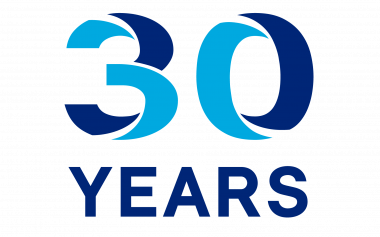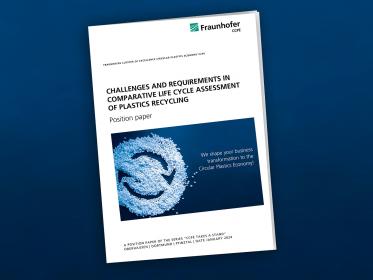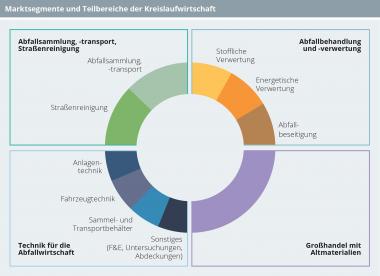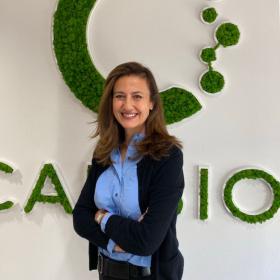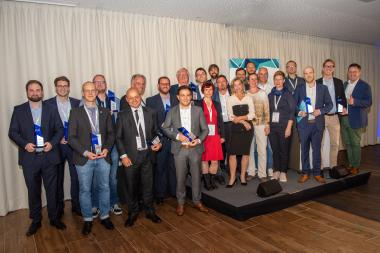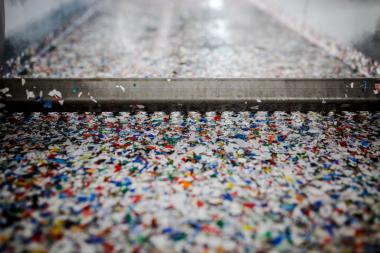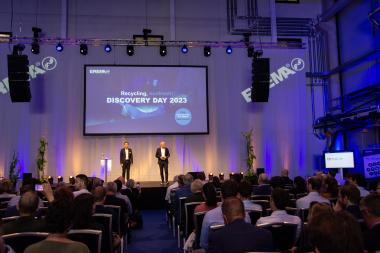Techtextil Innovation Awards 2024
Die Gewinner der diesjährigen Innovation Awards der internationalen Leitmessen Techtextil und Texprocess stehen fest. 15 Preisträger in acht Kategorien erhalten die Auszeichnung für wegweisende Forschung, neue Produkte, Verfahren oder Technologien. Die prämierten Innovationen zeigen textile Lösungen als essenzielle Treiber für Weiterentwicklungen in zahlreichen Branchen wie Luftfahrt, Automobil, Medizin oder Bau.
Gewinner Techtextil Innovation Award
Flugzeuge besser recyceln
Leichter als viele Metalle und flexibel im Design: Faserverbundwerkstoffe sind aus der modernen Luft- und Raumfahrt nicht mehr wegzudenken. Die textilverstärkten Leichtbaumaterialien, meist eine Mischung aus Glas- oder Kohlenstofffasern und Kunstharz, reduzieren das Gewicht von Flugzeugen – und damit deren Treibstoffverbrauch – so stark, dass manche modernen Flieger inzwischen zu mehr als 50 Prozent aus ihnen bestehen. Damit stellt sich auch immer dringlicher die Frage nach dem Recycling dieser Verbundmaterialien. Für ein neues Verfahren, mit dem Flugzeugteile aus thermoplastischem Faserverbund künftig besser recycelt werden können sollen, erhält das belgische Textilforschungsinstitut Centexbel den Techtextil Innovation Award in der Kategorie „New Approaches on Sustainability & Circular Economy“. Das prämierte Verfahren, dessen Entwicklung nach Angaben von Centexbel eng von Airbus begleitet wurde, nutzt Induktionswärme. Mit ihrer Hilfe kann man verschweißte thermoplastische, textilverstärkte Verbundwerkstoffe erhitzen und anschließend voneinander lösen. Stringer, Teile von Tragflächen und andere textilbasierte Flugzeugteile sollen sich so künftig besser trennen und wiederverwenden lassen.
Smartes Dach
Der Techtextil Innovation Award in der Kategorie „New Product“ geht an das portugiesische Technologiezentrum für Textil- und Bekleidungsindustrie CITEVE für ein intelligentes, textilverstärktes Abdichtungssystem für Flachdächer. Das „Smart Roofs System“ (SRS) besteht aus einer thermisch reflektierenden, flüssigen Abdichtungsmembran auf Wasserbasis und einer intelligenten textilen Verstärkungsstruktur aus einem Jacquard-Gewebe aus recyceltem Polyester. Diese enthält elektronische Garne, die auf Wärme, Temperatur und Feuchtigkeit reagieren. Das innovative System bietet laut CITEVE eine bessere technische Leistung und ist nachhaltiger als bisherige Lösungen für Flüssigmembranen.
Drei Preisträger in der Kategorie „New Technology“:
Selbstkühlende Textilien gegen Klimawandel-Folgen
Eine neuartige Beschichtung für selbstkühlende Textilien der Deutschen Institute für Textil- und Faserforschung Denkendorf (DITF) erhält einen Techtextil Innovation Award in der Kategorie „New Technology“. Anders als Sonnenschirme oder Markisen, die die Sonneneinstrahlung nur indirekt abhalten, ermöglicht die Beschichtung es Textilien, selbst aktiv zu kühlen. Dazu reflektiert sie nicht nur das Sonnenlicht, sondern strahlt auch Wärmeenergie wieder ab. Die Entwicklung der Beschichtung erfolgt auch vor dem Hintergrund steigender Temperaturen durch den Klimawandel. Der Kühlenergiebedarf in Städten sei zwischen 1970 und 2010 um 23 Prozent gestiegen. Bisher sorgen vor allem Ventilatoren und Klimaanlagen für Abkühlung. Doch die verbrauchen viel Strom: Bereits 2018 schätzte die Internationale Energieagentur (IEA), dass rund zehn Prozent des weltweiten Strombedarfs auf Klimaanlagen und Ventilatoren entfallen; 2050 könnten Klimaanlagen laut IEA nach der Industrie der zweitgrößte Treiber des globalen Energiebedarfs sein.
Besserer Schutz vor Sepsiserregern
Sepsis, auch bekannt als Blutvergiftung, ist weltweit für jeden fünften Todesfall verantwortlich. Ursache der Infektion sind häufig Mikroorganismen wie Bakterien, Pilze oder Viren, die auch in Krankenhauswäsche vorkommen und von dort über Wunden in den Körper gelangen können. Das hessische Unternehmen Heraeus Precious Metals erhält einen Techtextil Innovation Award in der Kategorie „New Technology“ für eine neue antimikrobielle Technologie, die Krankenhauspatient*innen künftig besser vor Sepsiserregern schützen soll. Dabei handelt es sich um ein Additiv auf Edelmetallbasis mit dem Namen AGXX. Kleidung und Bettwäsche in Krankenhäusern und Pflegeeinrichtungen sollen so künftig besser antimikrobiell ausgestattet werden können als mit derzeitigen Lösungen. Und so funktioniert es: In Textilien eingearbeitet, löst AGXX durch das Zusammenwirken der Edelmetalle Silber und Ruthenium eine katalytische Reaktion aus, die reaktiven Sauerstoff erzeugt, der Mikroorganismen wirksam abtöten soll. Die antimikrobielle Wirksamkeit der prämierten Neuentwicklung konnte Heraeus nach eigenen Angaben bisher bei 130 verschiedenen Mikroorganismen nachweisen und zudem zeigen, dass diese auch nach 100 Wäschen im Textil erhalten bleibt.
Smarte Textilpumpe hält Kleidung trocken
Bei Kleidung ist Komfort einer der wichtigsten Aspekte. Er leidet schnell, wenn ein Kleidungsstück nass wird, zum Beispiel durch Schweiß. Um diesen künftig schon während des Tragens aus Hemd oder Jacke zu entfernen, hat das schwedische Unternehmen LunaMicro eine intelligente Feuchtigkeitsmanagement-Technologie entwickelt. Dabei handelt es sich um ein mehrlagiges, poröses Textil, das mit einer kleinen Batterie verbunden ist. Eingearbeitet in ein Kleidungsstück, soll diese smarte Textilpumpe Flüssigkeiten wie Schweiß aktiv aus dem Inneren der Kleidung nach außen befördern und die Träger*innen trocken halten. Für die in Schweden und den USA patentierte elektroosmotische Textilpumpe erhält das Unternehmen einen Techtextil Innovation Award in der Kategorie „New Technology“. Die Innovation soll schon bald in Outdoor- und Arbeitsschutzkleidung sowie in persönlicher Schutzausrüstung (PSA) zum Einsatz kommen.
Zwei Preisträger in der Kategorie “New Concept”:
Nachhaltiges Bauen: Bis zu 30 Prozent Beton einsparen
Rund 40 Prozent der globalen CO2-Emissionen entfallen derzeit auf den Bau- und Gebäudebereich. Vor allem bei der Herstellung von Beton, einem der wichtigsten Baustoffe, werden große Mengen CO2 freigesetzt. Das Institut für Textilmaschinen und Textile Hochleistungswerkstofftechnik (ITM) und das Institut für Massivbau (IMB) an der TU Dresden erhalten einen von zwei Techtextil Innovation Awards in der Kategorie „New Concept“ für ein neues Fertigungsverfahren von Betonfertigteilen unter Verwendung von Carbon, mit dem sich bis zu einem Drittel Beton einsparen lassen soll. Darum geht es: Um Material zu sparen, kommen im Neubau vorzugsweise sogenannte Hohlkörperdecken zum Einsatz. Das sind Betonfertigteile, die im Gegensatz zu massiven Stahlbetondecken Hohlräume enthalten und daher weniger Beton benötigen. Mit dem neuen Fertigungsverfahren, das die Institute mit Unternehmen der Textil- und Baubranche entwickelt haben, lassen sich Hohlkörperdecken-Betonfertigteile mit Carbon herstellen, die künftig noch weitaus mehr Beton und damit CO2 einsparen sollen. Mit dem prämierten Verfahren sollen sich Privat- und Industriegebäude schon bald nachhaltiger und ressourcenschonender bauen lassen als bisher.
Veganes Leder aus Hanfabfällen
Ebenfalls in der Kategorie „New Concept“ wird das Biotech-Start-up Revoltech mit einem Techtextil Innovation Award ausgezeichnet. Das junge Unternehmen aus Darmstadt erhält den Preis für seinen veganen, vollständig recycelbaren Lederersatz aus Hanffasern namens „LOVR“ (ein Akronym für „lederähnlich, ohne Plastik, vegan, reststoffbasiert“). Laut Revoltech ist es der „weltweit erste wirklich zirkuläre Lederersatz“. Vegane Lederalternativen hätten bisher oft zwei Probleme: Entweder seien sie nicht rein pflanzlich, weil sie erdölbasierte Bestandteile enthielten, oder sie würden im Labor gezüchtet und seien daher schwer skalierbar. LOVR dagegen vereint laut Fuhrmann Skalierbarkeit und 100-prozentige Kompostierbarkeit. Die für LOVR verwendeten Hanfabfälle stammen aus dem industriellen Hanfanbau. Der prämierte Lederersatz ist Revoltech zufolge bereits in Schuhen und in einem Konzeptfahrzeug des Autoherstellers KIA im Einsatz. Bald soll er auch bei Polstermöbeln, in Autoinnenräumen und Bekleidung für mehr Nachhaltigkeit sorgen.
Zwei Preisträger in der Kategorie “New Technologies on Sustainability & Recycling”:
Fasern nachhaltiger zu 3D-Formen verbinden
In der Kategorie „New Technologies on Sustainability & Recycling“ geht ein Techtextil Innovation Award an Norafin Industries aus dem sächsischen Mildenau. Der Preis würdigt das neue Verfahren „Hydro-Shape“, mit dem sich Fasern mit Hochdruckwasserstrahlen zu einer 3D-Form verbinden lassen. „Statt nur textile Flächen zu erzeugen, können mit dem neuen Verfahren dreidimensionale Strukturen von der Faser bis zum Endprodukt in einem Schritt hergestellt werden. Im Ergebnis entstehe ein textiles 3D-Produkt, das in Sachen Abfallreduzierung neue Wege gehe und zudem aus biologisch abbaubaren Naturfasern hergestellt werden könne. Die Entwicklung der Technologie erfolgte laut Jolly auch vor dem Hintergrund der Single-Use-Plastics Directive, einer EU-Richtlinie zur Bekämpfung von Einwegplastik, die 2021 in Kraft trat. Auf der Techtextil will Norafin das nun ausgezeichnete Fügeverfahren erstmals der Öffentlichkeit vorstellen.
Biobasierte Isolationstextilien statt synthetischer Dämmstoffe
Eine gute Wärmedämmung von Gebäuden ist wichtig für den Klimaschutz, denn sie reduziert den Energieverbrauch und damit die benötigte Heizenergie. Dämmstoffe wie Polyurethan oder Styropor dämmen zwar gut, enthalten aber auch fossile Rohstoffe. Um solche synthetischen Materialien in Zukunft zu ersetzen und nachhaltiger zu dämmen, hat das Aachener Start-up SA-Dynamics gemeinsam mit Industriepartnern recycelbare Dämmtextilien aus biobasierten Aerogelfasern entwickelt. Dafür erhält das Unternehmen den zweiten Techtextil Innovation Award in der Kategorie „New Technologies on Sustainability & Recycling“. Die EU und Regierungen vieler Staaten setzen auch bei der Gebäudedämmung verstärkt auf regulatorische Maßnahmen für mehr Klima- und Umweltschutz. Die neuen Isolationstextilien aus Aerogelfasern, die zu über 90 Prozent aus Luft bestehen und sich auf Textilmaschinen verarbeiten lassen, sollen synthetische Dämmstoffe in ihrer Schutzwirkung sogar übertreffen
Messe Frankfurt












